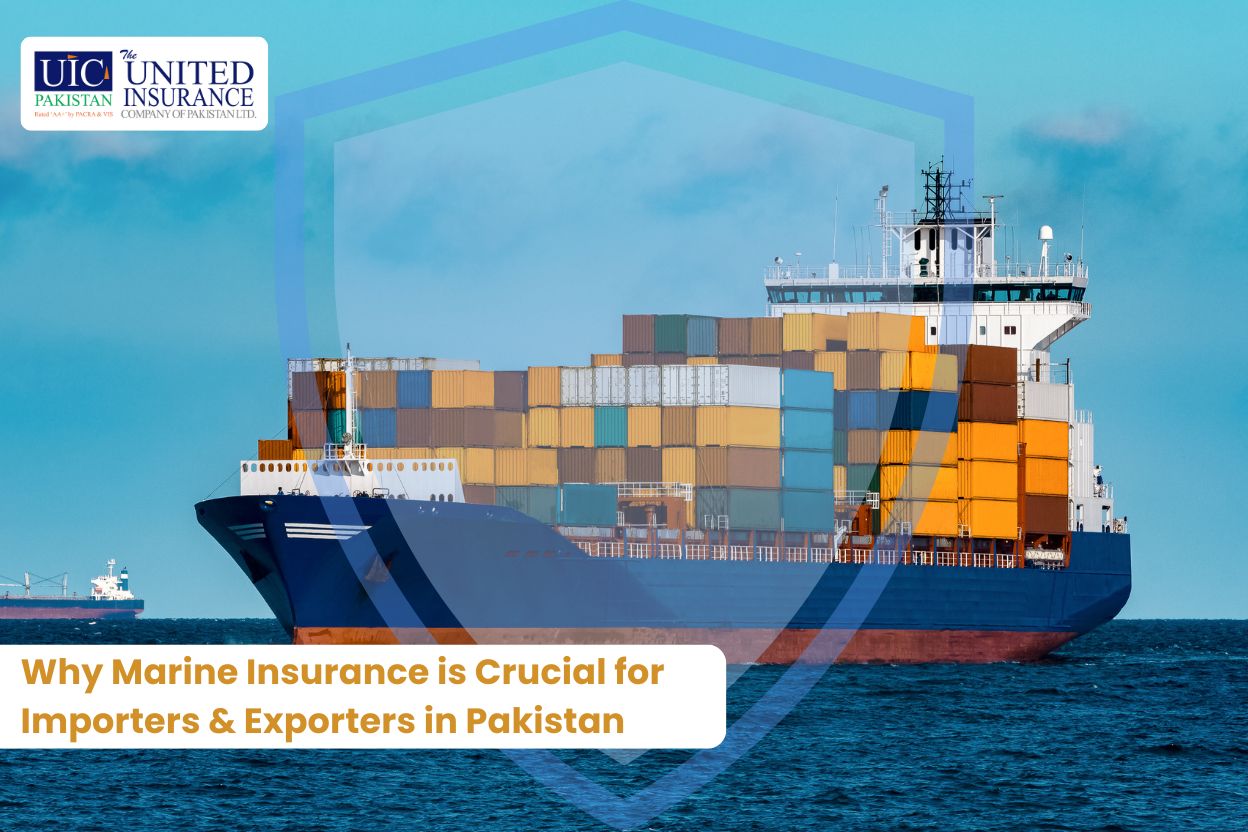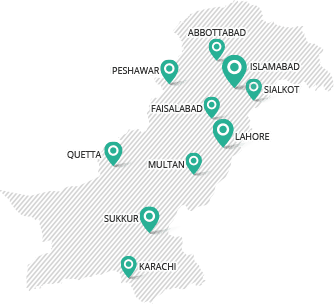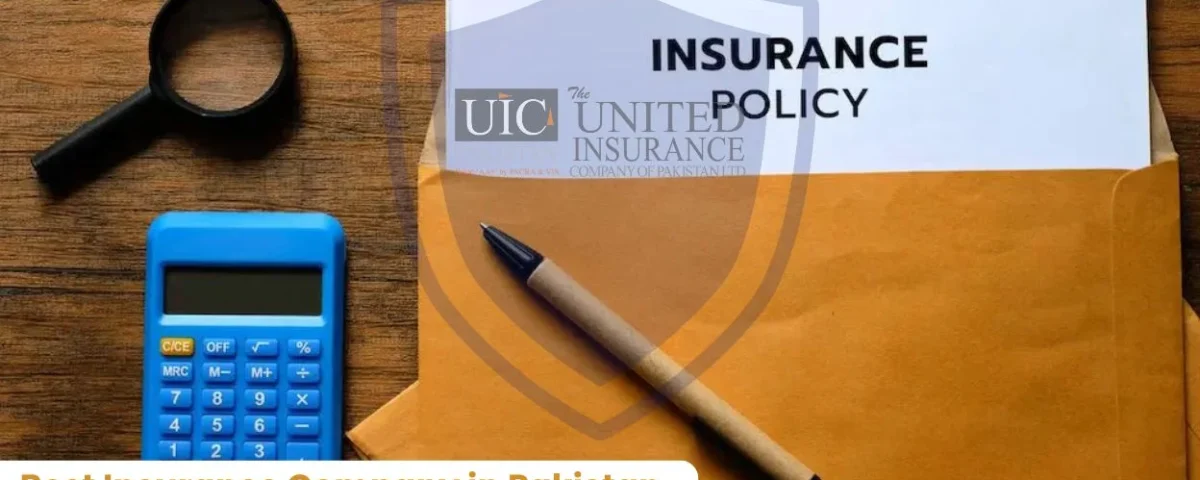Why Marine Insurance is Crucial for Importers & Exporters in Pakistan
 August 21, 2025
August 21, 2025

In today’s fast-paced global economy, international trade plays a vital role in the growth of Pakistan’s economy. Importers and exporters are the backbone of this system, ensuring that goods flow smoothly between Pakistan and the rest of the world. However, transporting goods across seas, rivers, and international waters carries numerous risks. From natural disasters to theft, accidents, and unforeseen circumstances, cargo is vulnerable throughout its journey. This is where Marine Insurance becomes crucial for businesses in Pakistan engaged in import and export activities.
In this blog, we will explore what marine insurance is, why it is essential for importers and exporters in Pakistan, and how it safeguards businesses against potential financial losses.
What is Marine Insurance?
Marine Insurance is a specialized type of insurance that covers goods, ships, cargo, and transport-related losses during transit by sea, air, or land. It provides financial protection against risks such as:
- Loss or damage due to accidents, fire, or sinking of ships.
- Theft, piracy, or malicious acts during transit.
- Natural disasters such as storms, cyclones, or earthquakes.
- Damage while loading, unloading, or transporting goods at ports.
For Pakistani importers and exporters, marine insurance ensures that they do not bear the full financial burden if something goes wrong while goods are in transit.
Importance of Marine Insurance in Pakistan’s Trade Sector
Pakistan heavily relies on imports and exports for economic growth. The country imports machinery, raw materials, and oil while exporting textiles, rice, fruits, and manufactured goods. With the majority of trade conducted via sea routes, risks are inevitable. Marine insurance provides a safety net in the following ways:
1. Protection Against Financial Losses
Importers and exporters in Pakistan often deal with shipments worth millions of rupees. A single mishap at sea can cause massive losses. For instance, if a vessel carrying textile consignments is damaged due to a storm, the exporter could lose months of effort and investment. Marine insurance ensures compensation for such losses, allowing businesses to recover without facing financial ruin.
2. Compliance with International Trade Requirements
Many international buyers and suppliers require proof of marine insurance before finalizing trade agreements. Without it, Pakistani businesses may lose opportunities to work with global partners. Having marine insurance builds credibility and shows that the business is prepared to handle risks professionally.
3. Coverage Against Unforeseen Events
Events like piracy in international waters or port strikes are unpredictable but can delay or damage shipments. For example, shipments traveling through the Gulf of Aden—a route often affected by piracy—are particularly vulnerable. Marine insurance covers such incidents, giving peace of mind to traders.
4. Safeguarding the National Supply Chain
Imports are critical for industries in Pakistan, especially sectors like energy, pharmaceuticals, and manufacturing. Any major disruption in imports can affect the entire supply chain. Marine insurance reduces the impact of such disruptions by ensuring financial compensation, which helps businesses resume operations faster.
Types of Marine Insurance Policies for Importers & Exporters
Understanding the different types of marine insurance policies helps businesses choose the right coverage. The main types include:
1. Cargo Insurance
This policy covers the goods being transported. For exporters in Pakistan sending rice, textiles, or leather goods overseas, cargo insurance ensures that goods are protected from damage or loss during shipment.
2. Hull Insurance
This policy covers the ship itself against damage caused by accidents or natural disasters. Although more relevant to shipping companies, it indirectly benefits importers and exporters by ensuring that their chosen carriers are financially secure.
3. Freight Insurance
Freight charges are often significant in international trade. If goods are lost or damaged, freight insurance ensures that the shipping costs are also covered, saving businesses from additional financial stress.
4. Liability Insurance
This covers liabilities that may arise if a ship damages another vessel, port property, or goods during transit. It is especially important for exporters who might face claims from foreign partners due to damaged goods.
Why Marine Insurance is Crucial for Pakistani Businesses
1. High-Risk Shipping Routes
Pakistan’s imports and exports often travel through high-risk regions such as the Arabian Sea and Gulf of Aden. These waters are vulnerable to piracy, storms, and accidents. Marine insurance protects businesses against these route-specific risks.
2. Protection for SMEs
Small and medium enterprises (SMEs) form the majority of exporters in Pakistan. Unlike large corporations, SMEs may not have the financial strength to absorb heavy losses. Marine insurance allows SMEs to expand internationally without fear of devastating setbacks.
3. Support for Export Growth
The government of Pakistan emphasizes increasing exports to stabilize the economy. Marine insurance plays a supportive role by reducing the risks associated with exporting goods abroad. This builds confidence among exporters to expand their reach into new markets.
4. Global Trade Competitiveness
International buyers prefer to work with businesses that have reliable risk management strategies. By having marine insurance, Pakistani importers and exporters can demonstrate professionalism and enhance their competitiveness in the global market.
Case Examples of Risks Faced by Pakistani Importers & Exporters
-
Textile Exporters: A container of textiles damaged by seawater during monsoon season can lead to losses worth millions.
-
Fruit Exporters: Perishable items like mangoes or kinnow exports may get spoiled if a ship is delayed due to port strikes.
-
Oil Importers: Oil shipments face risks of spillage or fire accidents. Without marine insurance, losses could disrupt energy supply in the country.
These examples show how vulnerable trade in Pakistan is without marine insurance.
How to Choose the Right Marine Insurance Policy in Pakistan
-
Assess Your Cargo Value – Select coverage that matches the actual value of your goods.
-
Understand Policy Terms – Some policies cover only specific risks, while others provide comprehensive coverage.
-
Work with Trusted Insurers – Partner with reputed insurance companies in Pakistan that specialize in marine insurance.
-
Consider Additional Coverage – Depending on the nature of goods (fragile, perishable, or high-value), add-on coverage may be necessary.
-
Seek Professional Advice – Insurance consultants can guide importers and exporters in choosing the best policies tailored to their needs.
The Future of Marine Insurance in Pakistan
With Pakistan’s growing participation in global trade and projects like the China-Pakistan Economic Corridor (CPEC), the demand for marine insurance is set to rise. More businesses are realizing that without proper insurance, a single shipment mishap could endanger their entire operations. As Pakistan develops its ports and shipping infrastructure, marine insurance will continue to play a pivotal role in safeguarding trade and boosting investor confidence.
Conclusion
For importers and exporters in Pakistan, international trade brings opportunities but also significant risks. Natural disasters, piracy, theft, accidents, and delays can all result in heavy financial losses. Marine Insurance is not just an optional safeguard—it is a necessity for businesses aiming to thrive in the global market. By protecting goods, finances, and reputation, marine insurance ensures that Pakistani traders can continue to contribute to the nation’s economic growth with confidence.
Whether you are a small business exporting textiles or a large company importing raw materials, investing in the right marine insurance policy is the smartest way to secure your trade journey.








